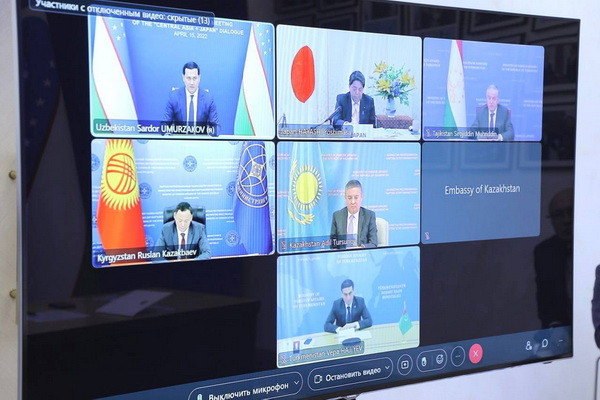
Dialogue "Central Asia + Japan" - an effective platform for cooperation
Tashkent, Uzbekistan (UzDaily.com) -- On 15 April this year, the 8th Meeting of Foreign Ministers of the Dialogue "Central Asia + Japan" was held in the format of a videoconference.
The event was attended by government representatives and heads of foreign affairs agencies of Japan, Uzbekistan, Kazakhstan, Turkmenistan, Kyrgyzstan and Tajikistan. The Republic of Uzbekistan was represented at the meeting by Deputy Prime Minister - Minister of Investments and Foreign Trade Sardor Umurzakov.
The main goals of this platform are to expand political dialogue, trade and economic cooperation, strengthen the presence of Japan and the positions of Japanese companies in Central Asia, expand cultural and humanitarian exchange with the countries of the region. The key areas of multilateral cooperation are political dialogue, development of intra-regional cooperation, business support; intellectual dialogue, strengthening of cultural ties and exchange of human capital. Also, within the framework of the Dialogue, issues of cooperation in the field of combating terrorism and the spread of drugs, regional security, agriculture, water and energy resources, transport and logistics, environmental protection, tourism, and increasing trade and investment in the region are being worked out and agreed upon.
The agenda of the meeting was focused on comprehensive measures to strengthen cooperation between the countries of Central Asia and Japan, in particular on cooperation in the field of countering the COVID-19 pandemic, strengthening border control, regional security and cooperation to achieve the Sustainable Development Goals.
Representatives of the countries participating in the meeting in their speeches outlined the current state of cooperation with Japan, outlined topical issues in priority areas of cooperation, and put forward proposals for further deepening the partnership.
Sardor Umurzakov, addressing the participants of the meeting, outlined the readiness of Uzbekistan to intensify cooperation and expand the agenda of the Dialogue. He summed up the results of 30 years of cooperation between Uzbekistan and Japan, as well as voiced the areas that are most important in the context of developing interaction within this platform, including: expanding cooperation to combat infectious diseases by introducing advanced Japanese experience, creating joint pharmaceutical clusters and specialized scientific-educational institutions, ensuring sustainable socio-economic development by combating transnational and organized crime, drug trafficking, cybercrime and other security challenges, implementation of joint projects to diversify transport corridors, build new railways and highways, and develop the potential of air transportation. Also, measures for the development of the digital economy and electronic commerce, the introduction of Japanese technologies and know-how, the promotion of the "green economy", the containment of climate change processes and other areas were identified as priority areas for cooperation.
The Uzbek side put forward a number of new initiatives for further implementation, including the development of a joint poverty reduction program based on the Japanese One Village - One Product program, the promotion of the Green Agenda regional program for Central Asia, the transformation of the established in 2020 into Tashkent of the Japanese Digital University to the Central Asian Digital University in order to expand the coverage of the region with services for the training and advanced training of personnel in this field and the implementation of joint educational programs, and other promising ideas.
As a result of the event, the Japanese side expressed readiness to further contribute to the sustainable development of the region by expanding bilateral and multilateral dialogue with the countries of Central Asia.